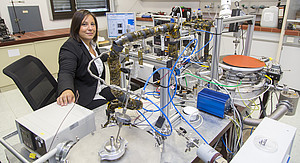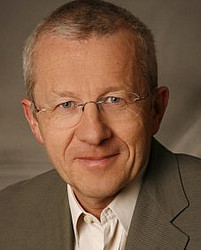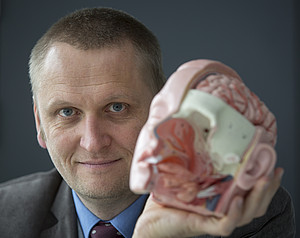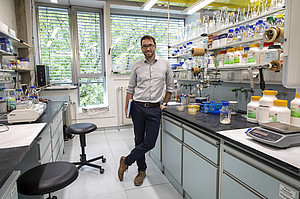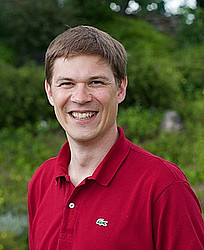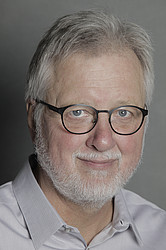End of this page section.
Go to overview of page sections.
Begin of page section: Additional information:
End of this page section.
Go to overview of page sections.
Flagship Scientists & Flagships
Begin of page section: Contents:
Flagship Scientists
BioTechMed-Graz flagship scientists are scientists at the research location Graz, who have been awarded an European Research Council (ERC) Grant, START or Wittgenstein Award (FWF).
Skin is one of the main human sensory organs. Through our skin we feel humidity, temperature and pressure – sensory impressions which are passed on to our brains as signals. The technological imitation of a system such as human skin and its information processing presents an enormous challenge to the technology of intelligent materials. This challenge is being met by chemist Anna Maria Coclite, assistant professor at the Institute of Solid State Physics at TU Graz and head of the CVD (Chemical Vapor Deposition) lab of the Institute.
In 2016 she received an ERC Starting Grant from the European Research Council to the amount of 1.5m euros for her research project to develop smart artificial skin.
Karl Kunisch, professor and head of the department of mathematics at the University of Graz, was awarded an Advanced Grant by the European Research Council for the project “From Open to Closed Loop Control” in 2015. ERC Advanced Grants are among the most important prizes in European research. The project addresses some of the most pressing topics in optimization and optimal control of differential equations. Optimizing radio-frequences pulses in magnetic resonance imaging and optimizing electrical stimuli to terminate caridiac arrhymhmia pose challenges applications in the biomedical sciences.
Gernot Müller-Putz is head of the Institute of Neural Engineering at Graz University of Technology and of the Graz Brain-Computer Interface Lab (BCI Lab). In 2015 he received an ERC Consolidator Grant for the project „FEEL YOUR REACH“. The project „FEEL YOUR REACH“ focuses on the control of neuroprosthesis.
In the past decade, first results in EEG-based control of a neuroprosthesis in several persons have been shown, however, the control is still unnatural and cumbersome.
The objective of the project is to develop a novel control framework that incorporates goal directed movement intention, movement decoding, error processing, processing of sensory feedback to allow a more natural control of a neuroprosthesis.
Gustav Oberdorfer and his research group work at the Institute on Biochemistry of the Graz University of Technology. Their expertise revolves around the topic of computational protein design. The fundamental question in protein design is, which amino acid composition will allow a protein to adopt a desired shape, with the assumption that the shape will in turn determine function. In 2018 he received the EUR 1.5 million ERC Starting Grant by the European Commission. In his ERC Grant "HelixMold - Computational design of novel functions in helical proteins by deviating from ideal geometries", Oberdorfer and his team aims to develop a method for the design and production of proteins with cavities that bind a specific small molecule and subsequently catalyze a reaction. This includes looking at specific applications, one of which involves trying to bind and break down the pesticide glyphosate. In general, computer-aided protein design opens up new approaches to solving biotechnological and biomedical problems.
CV Dr.rer.nat. Gustav Oberdorfer
Thomas Pock, Professor at the Institute of Computer Graphics and Vision at Graz University of Technology, received an ERC Starting Grant for the project HOMOVIS (High-level Prior Models for Computer Vision) in 2014. Computer vision is still far away from the abilities of the human visual system. On the one hand, the human vision is very general since it can recognize thousands of different objects in a variety of different geometric positions within a fraction of a second; on the other hand it is very distinctive since decisions are often based on very small visual details only. All this happens on the side seemingly without any energetic expenditure. Nowadays mathematical models and computers can by far not reproduce the fantastic computing performance of humans. The aim of this project is to develop new mathematical models and algorithms to teach computers to "see".
Rudolf Zechner, Professor at the Institute of Molecular Biosciences at the University of Graz, was awarded an ERC Advanced Grant for the project “LipoChEX“ in 2013.
The project investigates, how different cancers influence the lipid metabolism and the effects of a modulation of the lipid metabolism on cancer and cachexia. Additionally, a possible drug therapy will be investigated.
Rudolf Zechner received, among other awards, the Wittgenstein Award, the most highly endowed science award of Austria.
Flagships
The following Special Research Programmes (SFB) at the research location Graz are BioTechMed-Graz flagships:
The overall goal of the SFB Lipid Hydrolysis consortium is to investigate the biochemistry, cell biology, and physiology of lipid degradation pathways.
Seven research groups from Graz and Vienna build up the SFB Lipid Hydrolysis consortium. Six project leaders are BioTechMed-Graz full members. The objectives of the SFB Lipid Hydrolysis focus on the identification of unknown lipid hydrolases, the biochemical characterization and physiological function of established and newly identified lipid hydrolases in model organisms, on the regulation of lipid hydrolysis, and on the pathophysiology of lipid degradation in human disease.
The results will show how individual lipid hydrolases influence the development of metabolic diseases such as obesity, diabetes, non-alcoholic fatty liver disease or cancer. The long-term goal of the SFB Lipid Hydrolysis is to discover new treatment options for these extremely common health problems worldwide.
The goal of the SFB-LIPOTOX is to unify relevant research forces in Graz on one theme: Lipotoxicity. The research consortium defines lipotoxicity as the anomalous uptake, generation, and activity of lipid derivatives mediating adverse, “lipotoxic” effects including dysregulation of metabolic pathways, cell- and organelle dysfunction, and cell death. We expect our findings to contribute to the identification of valid targets for disease intervention.
Since May 2007 scientists of Uni Graz, TU Graz and Med Uni Graz are working together in SFB MOBIS. The central scheme of the proposed SFB is continuous optimization in the context of differential equations and variational inequalities as well as the development of associated numerical methods. Applications include mathematical image analysis for the life sciences and muti-physics modelling of cardiac function.
SFB MOBIS: Mathematical Optimization and Applications in Biomedical Sciences
End of this page section.
Go to overview of page sections.

